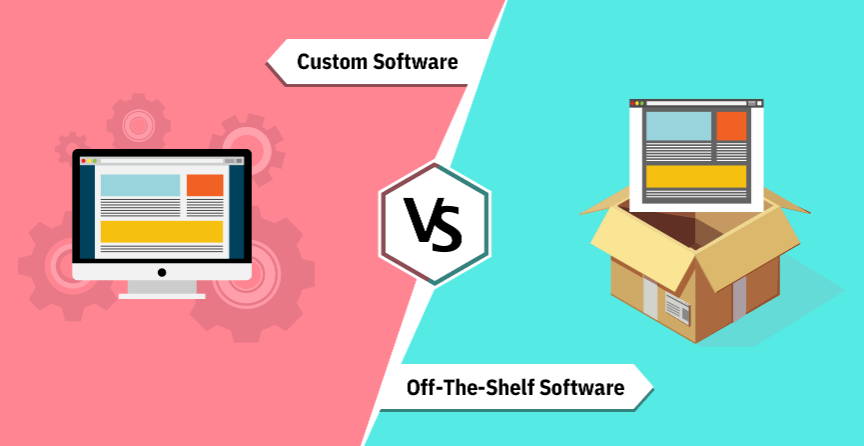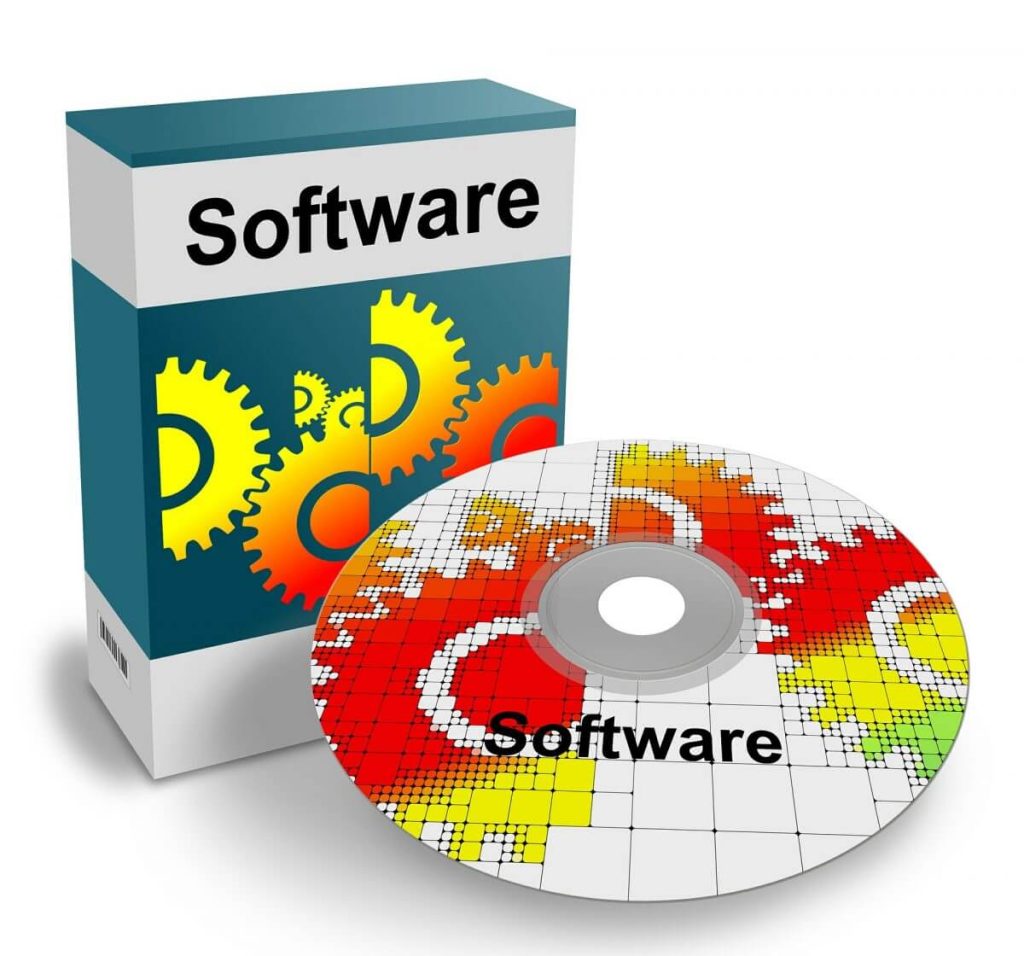Table of Contents
Custom Software vs Off-The-shelf Software

Definition of custom software and off-the-shelf software
Custom software and off-the-shelf software are two distinct types of software that can be used for a variety of purposes. Custom software is a type of software that is specifically designed and developed for a particular business or organization. It is unique and tailored to meet the specific needs and requirements of the customer, and is built from scratch by a team of software developers. Custom software is often more expensive than off-the-shelf software, but it provides greater control and flexibility, as well as the ability to scale and adapt to changing business needs over time.
On the other hand, off-the-shelf software is a type of software that is pre-built and available for purchase by anyone. It is designed to meet the needs of a broad range of businesses or organizations and is often less expensive than custom software. Off-the-shelf software can be downloaded and implemented quickly, and vendors typically provide support and maintenance services for their product. However, off-the-shelf software may not meet all of the specific needs and requirements of a particular business, and customization options may be limited.
The choice between custom software and off-the-shelf software ultimately depends on the specific needs and requirements of a business or organization. Custom software provides greater flexibility and control, but comes with a higher initial cost and longer development time. Off-the-shelf software may be more cost-effective, but may not meet all of the specific requirements of a particular business or organization. In the end, the decision must be made with careful consideration of the long-term benefits and risks, and a deep understanding of the unique needs and requirements of the business.
Importance of choosing the right software for your business
Choosing the right software for your business is a critical decision that can have a significant impact on the success and growth of your organization. The software you choose will affect the way your business operates and how you interact with customers, employees, and partners. It can also impact the productivity and efficiency of your team, as well as the overall customer experience.
In today’s highly competitive business landscape, technology plays a critical role in driving growth, innovation, and profitability. Choosing the wrong software can lead to increased costs, decreased productivity, and reduced efficiency, which can ultimately result in lost business and revenue.
On the other hand, choosing the right software can help businesses to achieve their strategic goals, enhance customer satisfaction, and streamline business processes. It can also provide a competitive edge, allowing businesses to stay ahead of the curve and respond quickly to changing market conditions.
In addition to its impact on business operations, software can also have a significant impact on the well-being of your employees. By providing your team with the right tools and software, you can improve their productivity, reduce stress, and increase job satisfaction. This, in turn, can lead to better employee retention and increased morale.
Custom Software

Advantages of custom software

Tailored to your specific needs
One of the primary advantages of custom software is that it is tailored to meet the specific needs and requirements of your business. This means that the software is designed and developed with your business in mind, taking into account your unique workflows, processes, and goals.
Custom software is built from scratch, which means that every feature and functionality is developed with your specific needs in mind. This level of customization allows businesses to create a software solution that fits perfectly with their unique business model, rather than forcing the business to adapt to the limitations of pre-built off-the-shelf software.
This level of customization results in a number of benefits for businesses. Firstly, it can increase efficiency and productivity by streamlining processes and automating tasks that are specific to your business. This can save time and reduce errors, resulting in a more efficient and effective operation.
Secondly, custom software can provide greater control and flexibility, as businesses can make changes and updates to the software as their needs change. This means that the software can evolve alongside the business, providing an adaptable and scalable solution.
Finally, custom software can provide businesses with a competitive edge, as it can be designed to meet specific industry standards and regulations. This level of compliance can provide peace of mind and a competitive advantage, especially in highly regulated industries.
Increased efficiency and productivity
One of the major advantages of custom software is that it can significantly increase the efficiency and productivity of a business. Custom software is specifically designed and developed to meet the unique needs and requirements of a business, which means that it can be tailored to fit seamlessly into the existing workflows and processes of the organization.
Unlike off-the-shelf software that often has generic features, custom software is designed to automate specific tasks and streamline workflows that are unique to a particular business. This level of customization can reduce the time and effort required to complete complex or repetitive tasks, enabling employees to focus on more strategic and valuable activities.
Additionally, custom software can provide businesses with real-time data and insights that can be used to make informed decisions and drive productivity. By integrating with existing systems and databases, custom software can provide a unified view of business operations, which can help employees to work more efficiently and effectively.
Another advantage of custom software is that it can be developed with user experience in mind. By designing software that is easy to use and navigate, businesses can reduce the time and effort required to train employees on new software systems. This can also help to reduce errors and increase user adoption, ultimately leading to improved productivity.
Greater control and flexibility
Custom software provides businesses with greater control and flexibility over their technology infrastructure. Unlike off-the-shelf software, custom software is designed specifically for the needs and requirements of a particular business. This means that businesses can have complete control over the features and functionalities of the software.
One of the advantages of custom software is that it can be built to integrate seamlessly with existing systems and technologies. This means that businesses can maintain control over their entire technology stack, including hardware, databases, and other software applications. This level of integration can help to reduce downtime and increase productivity, as there is no need to switch between different software applications.
Another advantage of custom software is that it can be developed to adapt and evolve as the needs of the business change. Businesses can add new features and functionalities to the software as they grow, or make changes to the software as new regulations or standards are introduced. This level of flexibility can help businesses to remain agile and responsive to changing market conditions.
Custom software can also provide businesses with greater security and data protection. By designing software that is specific to the needs of the business, custom software can be developed with security features and protocols that meet the unique requirements of the organization. This level of customization can help to reduce the risk of cyber attacks and data breaches, ultimately leading to greater peace of mind and trust from customers.
Scalability
Custom software provides businesses with a high level of scalability, which means that the software can grow and evolve alongside the business. This level of scalability is a key advantage of custom software, as it can help businesses to remain competitive and successful in the long term.
One of the advantages of custom software is that it can be designed to be modular and extensible. This means that businesses can add new features and functionalities to the software as their needs change and their operations grow. For example, if a business expands into new markets or introduces new products or services, custom software can be adapted to support these changes.
Custom software can also be designed with performance and optimization in mind. This means that the software can be built to handle large volumes of data or high transaction volumes. As a business grows, its data and transaction volumes will also grow, and custom software can be designed to handle this increased workload.
Another advantage of custom software is that it can be developed to integrate with a wide range of third-party applications and systems. This level of integration can help businesses to scale their operations and streamline their workflows, by connecting various applications and systems together to create a unified technology stack.
Disadvantages of custom software

Higher initial cost
One of the main disadvantages of custom software is that it typically comes with a higher initial cost than off-the-shelf software. Custom software is designed and developed specifically for a particular business, which means that it requires a significant investment of time, resources, and expertise to build.
The cost of custom software development can vary widely depending on the complexity of the software, the level of customization required, and the expertise of the development team. In many cases, businesses may need to hire a team of software developers and project managers to build custom software, which can be expensive.
Another factor that can contribute to the higher initial cost of custom software is the need for ongoing maintenance and support. Unlike off-the-shelf software, custom software requires ongoing support and updates to ensure that it remains secure, up-to-date, and fully functional. This ongoing maintenance can also contribute to the overall cost of custom software.
However, it’s important to note that while custom software may have a higher initial cost, it can often provide a higher return on investment over time. This is because custom software is designed specifically for the needs and requirements of a particular business, which can lead to increased efficiency, productivity, and revenue in the long run.
Longer development time
Another disadvantage of custom software is that it typically requires a longer development time than off-the-shelf software. This is because custom software is designed and developed from scratch, which means that the development process can be lengthy and complex.
The development time for custom software can vary widely depending on the complexity of the software, the level of customization required, and the expertise of the development team. In many cases, custom software may require multiple rounds of development and testing before it is ready for deployment, which can be time-consuming.
The longer development time for custom software can also mean that businesses may need to wait longer before they can start seeing the benefits of the software. This can be a significant disadvantage for businesses that need to move quickly to capitalize on new opportunities or to stay competitive in a fast-moving market.
However, it’s important to note that the longer development time for custom software can be worth it in the long run. This is because custom software is designed specifically for the needs and requirements of a particular business, which can lead to increased efficiency, productivity, and revenue over time.
Maintenance and support costs
Another disadvantage of custom software is the ongoing maintenance and support costs that are associated with it. Unlike off-the-shelf software, custom software requires ongoing support and updates to ensure that it remains secure, up-to-date, and fully functional.
The cost of ongoing maintenance and support can vary widely depending on the complexity of the software, the level of customization required, and the expertise of the development team. In many cases, businesses may need to hire a team of software developers and project managers to provide ongoing maintenance and support for custom software, which can be expensive.
Another factor that can contribute to the ongoing maintenance and support costs of custom software is the need for regular updates and bug fixes. Custom software may require regular updates to ensure that it remains compatible with the latest operating systems, hardware, and software.
However, it’s important to note that the ongoing maintenance and support costs of custom software can be worth it in the long run. This is because custom software is designed specifically for the needs and requirements of a particular business, which can lead to increased efficiency, productivity, and revenue over time.
Off-the-Shelf Software

Advantages of off-the-shelf software

Lower initial cost
One of the advantages of off-the-shelf software is that it typically has a lower initial cost than custom software. Off-the-shelf software is mass-produced and sold to many customers, which means that the cost of development is spread out over a large customer base.
This lower initial cost can be particularly appealing for businesses that have limited budgets or that are just starting out. Off-the-shelf software can provide businesses with access to powerful tools and features at a fraction of the cost of custom software.
However, it’s important to note that the lower initial cost of off-the-shelf software can come with its own set of drawbacks. Off-the-shelf software is not tailored to the specific needs and requirements of a particular business, which can lead to inefficiencies, limitations, and a lack of flexibility.
Quicker implementation time
Another advantage of off-the-shelf software is that it often has a quicker implementation time than custom software. Off-the-shelf software is readily available and can be implemented quickly with minimal customization or configuration.
This quick implementation time can be particularly appealing for businesses that need to move quickly to capitalize on new opportunities or to stay competitive in a fast-moving market. Off-the-shelf software can provide businesses with powerful tools and features that can be deployed quickly, allowing them to start seeing the benefits of the software sooner rather than later.
However, it’s important to note that the quick implementation time of off-the-shelf software can come with its own set of drawbacks. Off-the-shelf software is not tailored to the specific needs and requirements of a particular business, which can lead to inefficiencies, limitations, and a lack of flexibility.
Maintenance and support provided by the vendor
Another advantage of off-the-shelf software is that maintenance and support are often provided by the vendor. This means that businesses don’t have to worry about hiring a team of software developers and project managers to provide ongoing maintenance and support for the software.
The vendor typically provides regular updates, bug fixes, and other types of support to ensure that the software remains secure, up-to-date, and fully functional. This can save businesses time and money on maintenance and support, allowing them to focus on their core operations and strategies.
However, it’s important to note that the level of support provided by the vendor can vary widely depending on the software and the vendor. Some vendors may provide excellent support and regular updates, while others may provide minimal support and infrequent updates.
Established track record and user base
Another advantage of off-the-shelf software is that it often has an established track record and user base. This means that businesses can have a good idea of the software’s capabilities, features, and limitations based on the experiences of other users.
The established user base can also provide a wealth of resources and support for businesses that are using the software. Online forums, user groups, and other resources can provide tips, best practices, and troubleshooting support for businesses that are using the software.
This established track record and user base can provide businesses with confidence and peace of mind when selecting and implementing off-the-shelf software. Businesses can be reassured that the software has been tried and tested by other users, and that it has a track record of success in similar environments and industries.
However, it’s important to note that the established track record and user base of off-the-shelf software can come with its own set of limitations. The software may be less flexible and less able to accommodate unique business requirements than custom software, and may not be able to fully meet the needs of every business.
Disadvantages of off-the-shelf software

Limited customization options
One of the disadvantages of off-the-shelf software is that it has limited customization options. Because the software is designed to be used by a wide range of businesses and industries, it may not be able to fully accommodate the unique needs and requirements of a particular business.
This can be a significant disadvantage for businesses that have specific processes or workflows that are critical to their operations. The software may not be able to fully integrate with other systems or applications, or may not be able to automate certain tasks or workflows that are essential to the business.
However, it’s important to note that not all businesses require highly customized software, and that off-the-shelf software may be perfectly adequate for many businesses. Additionally, some off-the-shelf software may offer a degree of customization through the use of plugins, add-ons, or other integrations.
May not meet all of your business requirements
Another disadvantage of off-the-shelf software is that it may not meet all of a business’s specific requirements. Because the software is designed to be used by a wide range of businesses, it may not be able to fully accommodate the unique needs of a particular business.
This can be a significant disadvantage for businesses that have specific processes or workflows that are critical to their operations. The software may not be able to fully integrate with other systems or applications, or may not be able to automate certain tasks or workflows that are essential to the business.
However, it’s important to note that not all businesses require highly specialized software, and that off-the-shelf software may be perfectly adequate for many businesses. Additionally, some off-the-shelf software may offer a degree of customization through the use of plugins, add-ons, or other integrations.
Vendor may not provide desired features or support
Another potential disadvantage of off-the-shelf software is that the vendor may not provide desired features or support. Because the software is designed to be used by a wide range of businesses and industries, the vendor may not be able to provide the level of support or customization that a particular business requires.
This can be a significant disadvantage for businesses that require a high level of support or customization. The vendor may not be able to provide timely updates or fixes, or may not be able to address specific issues or bugs that are critical to the business.
However, it’s important to note that many off-the-shelf software vendors offer a high level of support and may be able to provide additional features or customizations for an additional cost. Additionally, many vendors offer online communities and support forums where users can ask questions and share information with each other.
Security risks
Another potential disadvantage of off-the-shelf software is the security risks that it may pose to a business. Because the software is designed to be used by a wide range of businesses, it may not be fully secure against potential threats and vulnerabilities.
This can be a significant disadvantage for businesses that deal with sensitive or confidential information. The software may be vulnerable to cyber attacks or other security breaches, which can compromise the security and privacy of the business’s data.
However, it’s important to note that many off-the-shelf software vendors prioritize security and invest in regular updates and patches to address potential vulnerabilities. Additionally, businesses can take steps to improve the security of their software, such as implementing additional security measures or working with a third-party security provider.
How to Choose

Factors to consider when choosing between custom and off-the-shelf software
Business needs and requirements
When choosing between custom and off-the-shelf software, there are several factors that businesses should consider. These may include the specific needs and requirements of the business, the budget and resources available, the level of customization and control required, and the potential for scalability and growth. By carefully evaluating these factors and weighing the potential benefits and drawbacks of each option, businesses can make an informed decision that best meets their unique needs and goals.
Budget and timeline
When choosing between custom and off-the-shelf software, budget and timeline are important factors to consider. Businesses should evaluate the cost and resources required for each option, as well as the expected timeline for implementation and any potential delays or setbacks. By carefully weighing the costs and timeline of each option, businesses can make a decision that best meets their budget and scheduling needs, while also achieving their desired outcomes and goals.
Available resources
Another important factor to consider when choosing between custom and off-the-shelf software is the available resources of the business. This may include the level of technical expertise and support available, as well as the overall capacity and availability of the team. By assessing the resources available, businesses can determine whether they have the necessary skills and capacity to develop and maintain custom software, or whether off-the-shelf software may be a better fit for their needs.
Scalability
Scalability is an important factor to consider when choosing between custom and off-the-shelf software. Businesses should evaluate their potential for growth and expansion, and assess whether the software they choose can meet their evolving needs and requirements over time. By choosing a software solution that is flexible and adaptable to changing business needs, businesses can ensure that they are able to scale and grow without experiencing significant roadblocks or limitations.
Integration with existing systems
Integration with existing systems is another important factor to consider when choosing between custom and off-the-shelf software. Businesses should evaluate whether the new software can seamlessly integrate with their existing technology infrastructure, and whether any additional investments or modifications will be required. By choosing a software solution that integrates smoothly with existing systems, businesses can ensure that they can maximize the benefits of the new software without experiencing any significant disruptions or complications.
Evaluation process
Research and evaluate potential software solutions
The evaluation process for choosing software begins with thorough research and evaluation of potential software solutions. Businesses should take the time to research and assess the features and capabilities of various software options, as well as their suitability for specific business needs and requirements. By conducting a comprehensive evaluation of potential software solutions, businesses can make informed decisions that best align with their goals and objectives.
Conduct a cost-benefit analysis
As part of the evaluation process for choosing software, businesses should conduct a cost-benefit analysis. This involves comparing the costs of the software solution against the potential benefits, such as increased efficiency, productivity, and revenue. By conducting a cost-benefit analysis, businesses can assess the overall value and return on investment of the software, and determine whether it is a feasible option for their budget and resources.
Consider long-term benefits and risks
In the evaluation process for choosing software, it’s important for businesses to consider the long-term benefits and risks of the software solution. This involves evaluating the potential impact of the software on the business over time, such as its scalability, adaptability, and security. By carefully considering the long-term benefits and risks of the software, businesses can make informed decisions that align with their goals and objectives, while minimizing potential risks and challenges.
Final thoughts and recommendations
In conclusion, the choice between custom and off-the-shelf software is a crucial decision for businesses to make. Each option comes with its own set of advantages and disadvantages, and businesses must carefully evaluate their needs and resources to make the right choice.
If your business requires tailored software solutions that are specifically designed to meet your unique requirements, then custom software may be the best option for you. With custom software, you can achieve increased efficiency and productivity, greater control and flexibility, and scalability, among other benefits.
However, custom software development requires a significant investment of time, resources, and money. It’s important to work with an experienced software development company, such as 3S Coding, to ensure that your custom software is built to your exact specifications and requirements.
3S Coding is a professional software development company that offers expert consultation and custom software development services for businesses of all sizes. Their experienced team of developers works closely with clients to deliver customized software solutions that are designed to meet their unique needs and requirements. They provide a range of services, from initial consultation and software design to development, testing, and ongoing support.
If you are looking to have professional business website, or have any doubts or questions please contact us and we will be happy to help.

